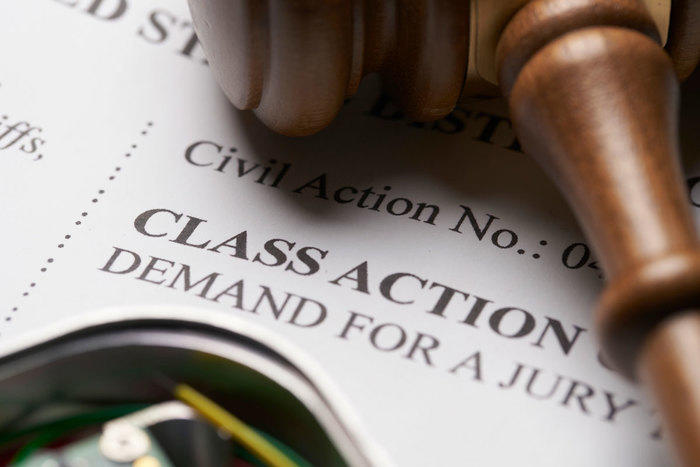Browsing Lawful Seas: Comprehending the Ins and Outs of Class Action Lawsuits
Wiki Article
Key Elements to Think About in Course Activity Legal Actions: Insights for Lawyers
Class activity legal actions can be difficult and complex for lawyers to browse. Comprehending these aspects and their ramifications is essential for lawyers intending to efficiently represent their clients in course action lawsuits.Course Accreditation Requirements
To wage a course action legal action, attorneys must browse via a series of rigorous course certification needs. Class qualification is a critical stage in the lawsuits process that determines whether a team of complainants can be accredited as a course and wage their insurance claims collectively. These needs serve to make certain that class activities are efficient and ideal mechanisms for resolving conflicts involving many plaintiffs.One of the key requirements for course qualification is numerosity. This requirement requires that the course be so countless that joinder of all members is unwise. While there is no set numerical threshold, courts usually consider a course with even more than 40 members as adequately countless. Additionally, commonality is one more essential element in course qualification. It needs that there are questions of legislation or reality common to the class, which need to predominate over specific issues.
Furthermore, typicality and adequacy of representation are important factors to consider. Typicality makes certain that the claims or defenses of the representative parties are typical of the class. Adequacy of representation ensures that the representatives will fairly and sufficiently secure the passions of the course members. Lastly, a class action should also satisfy the need of prevalence, indicating that a class activity is a superior approach for adjudicating the conflict compared to various other readily available approaches.
Navigating through these course certification needs can be complicated and tough for attorneys. However, understanding and conference these requirements are vital to successfully seek a class activity lawsuit in support of a group of complainants.

Commonality of Claims
The following vital element to consider in the course qualification process is the commonality of insurance claims among the complainants. Commonality describes whether the course members share comparable legal issues and inquiries of truth that can be fixed collectively. To put it simply, it is needed to figure out if there prevail concerns of law or truth that are central to the lawsuits and that predominate over any kind of private concerns.To establish commonness, the plaintiffs must demonstrate that there are lawful or factual problems that are common to the entire course. This can be accomplished by recognizing a typical course of conduct or a typical lawful theory that underlies the insurance claims (Class action lawsuit). The presence of typical questions is essential because it advertises judicial efficiency and economic climate by allowing a single choice to deal with the problems for the whole class
Nevertheless, it is essential to note that the commonness requirement does not require that all the specific claims be similar. Distinctions in problems or individual situations do not always beat commonness if there are still common concerns that bind the class together.

Problems Estimations
One critical facet to take into consideration when determining damages in course action lawsuits is the precise evaluation of economic losses incurred by the course members. In order to identify the proper amount of compensation, it is needed to examine the degree of injury suffered by each individual within the class. This can be a complicated job, as it needs a comprehensive analysis of different elements, such as the nature and duration of the damage, the monetary influence on the influenced people, and any kind of various other relevant considerations.When analyzing monetary losses, it is essential to consider both the indirect and direct problems experienced by the class participants. Direct damages refer to the real out-of-pocket expenses sustained as a result of the offender's activities.
To calculate problems accurately, legal representatives should collect extensive proof, including economic records, professional opinions, and statements from the course members. They might also need to involve economic and monetary professionals who can supply insights right into the long-lasting monetary effects of the harm experienced.
Negotiation Negotiations
Throughout negotiation negotiations, attorneys need to involve in calculated and careful discussions to reach an equally reasonable resolution for all parties entailed in the course action suit (Class action lawsuit). Negotiation arrangements are a crucial stage in the lawsuits procedure, where the parties attempt to reach a compromise without going to test. These arrangements call for lawyers to employ their negotiation skills, legal experience, and understanding of the case's weaknesses and strengthsOne essential aspect to take into consideration throughout negotiation arrangements is the possible threats and prices linked with continuing to test. Lawyers have to carefully evaluate the possibility of success at trial and weigh it against the potential advantages of a negotiation. They need to additionally take into consideration the prospective time and sources that would be required to undergo a trial, along with the possible adverse promotion that might result from a public trial.
Another vital aspect is the rate of interests and issues of the class participants. Lawyers need to understand what the class participants really hope to accomplish through the lawsuit and just how a negotiation can address their grievances. By considering the course members' perspectives and talking to them throughout the settlement process, lawyers can better advocate for their passions and make sure that any type of negotiation gotten to is fair and acceptable.
Moreover, attorneys have to be prepared to discuss with the opposing party and their lawful agents. This calls for a deep understanding of the staminas and weaknesses of both sides' disagreements and a willingness to endanger. Competent negotiators can utilize this knowledge to locate usual ground and craft creative remedies that meet the demands of all parties included.
Effective Client Depiction
To efficiently represent their customers in class action lawsuits, attorneys have to possess a detailed understanding of the case and vigilantly supporter for their clients' rate of interests. Reliable client representation needs legal representatives to establish open lines of interaction and keep a strong attorney-client relationship throughout the entire lawsuits procedure.
Most importantly, attorneys need to thoroughly evaluate the realities, lawful issues, and prospective dangers linked with the instance. This includes conducting an in-depth examination, assessing relevant files, and talking to professionals if essential. By obtaining a deep understanding of the case, lawyers can develop a tactical technique customized to their customers' objectives and needs.
Additionally, attorneys need to proactively support for their customers' passions throughout all phases of the lawsuit. This involves drafting persuasive legal arguments, conducting extensive study, and offering engaging evidence to sustain their clients' insurance claims. Attorneys ought to likewise stay notified regarding recent advancements in course activity regulation and utilize this expertise to reinforce their clients' placements.
In enhancement to lawful campaigning for, efficient client depiction involves supplying routine updates, answering concerns, and addressing any kind of issues that clients might have. Attorneys should be aggressive in keeping their customers informed concerning the development of the case check this and any kind of substantial developments that might impact the end result.
Eventually, effective customer representation calls for lawyers to be attentive, responsive, and committed to securing their clients' legal rights and interests. By embracing a client-centered approach, attorneys can optimize the chances of attaining a favorable result in course action claims.
Conclusion
Finally, lawyers associated with course activity legal actions should think about crucial variables such as class certification demands, the commonality of insurance claims, problems estimations, negotiation arrangements, and effective client representation. By thoroughly attending to these aspects, legal representatives can boost their chances of success in class action lawsuits and ensure that the interests of their clients are safeguarded.
Comprehending these aspects and their effects is critical for legal representatives intending to properly represent their customers in course action claims.To proceed with a course activity legal action, legal representatives have to browse with a series of strict class certification requirements. Course qualification is a crucial additional hints phase in the lawsuits procedure that identifies whether a group of plaintiffs can be certified as a course and continue with their insurance claims collectively. A course activity should also please the demand of supremacy, meaning that a course activity is an exceptional approach for adjudicating the dispute contrasted to various other available methods.
One crucial facet go to these guys to think about when calculating problems in class activity claims is the accurate analysis of economic losses sustained by the course participants.
Report this wiki page